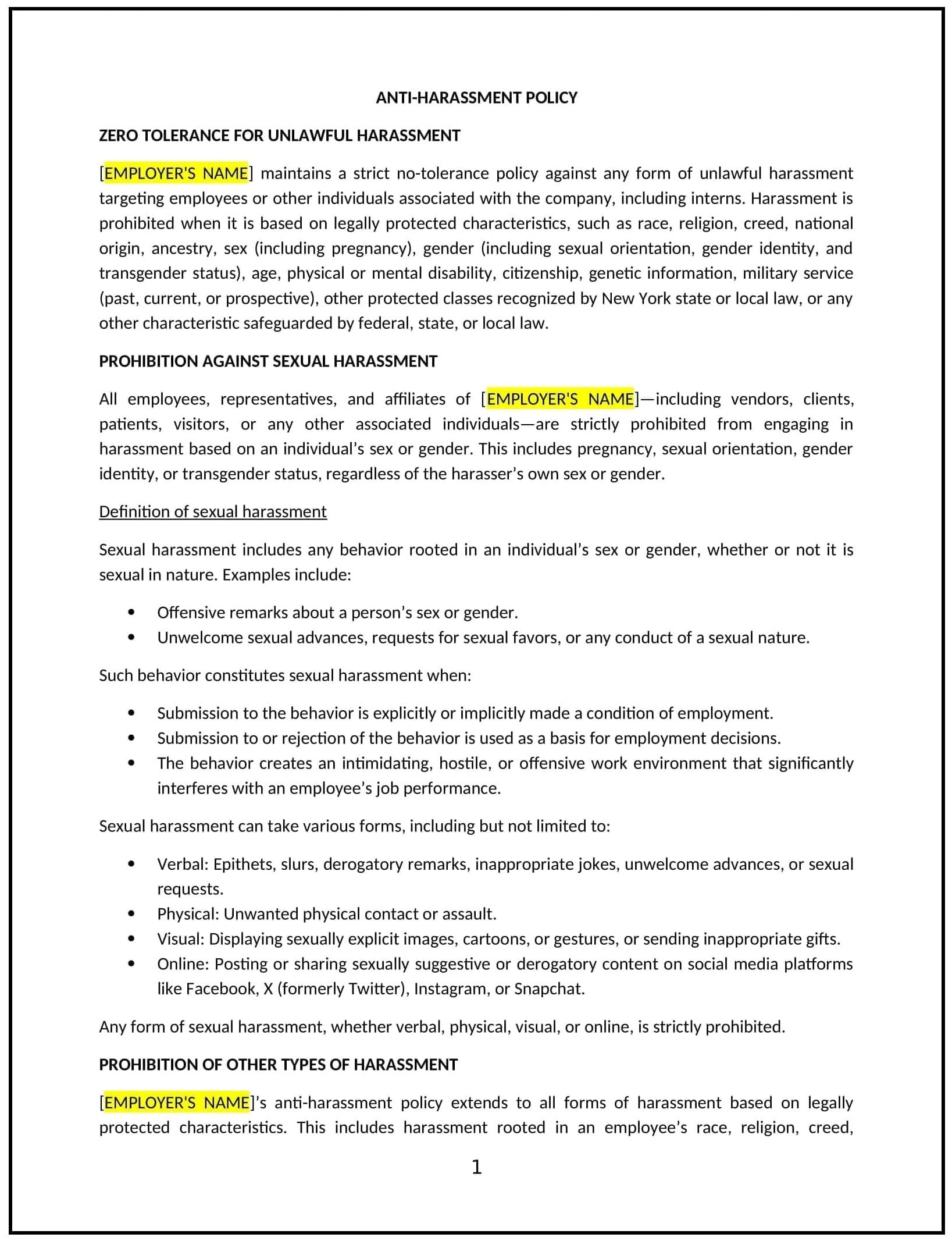Got contracts to review? While you're here for policies, let Cobrief make contract review effortless—start your free review now.

Customize this template for free
Anti-harassment policy (New York)
An anti-harassment policy helps New York businesses create a respectful and safe workplace by setting clear expectations and providing a framework for addressing any form of harassment. This policy outlines the various types of harassment prohibited within the workplace, including sexual harassment, racial harassment, and any form of discrimination or bullying. It also details the process for employees to report harassment, the steps for investigating complaints, and the disciplinary actions to be taken for violations.
By implementing this policy, businesses can foster a culture of respect and inclusivity, support employee well-being, and comply with New York state and federal anti-harassment laws, minimizing legal risks and enhancing the work environment.
How to use this anti-harassment policy (New York)
- Define harassment: Clearly outline what constitutes harassment, including verbal, physical, and visual conduct that creates a hostile, intimidating, or offensive work environment. The policy should cover all forms of harassment based on protected characteristics such as race, gender, religion, sexual orientation, disability, etc.
- Establish reporting procedures: Provide employees with confidential and accessible ways to report incidents of harassment. The policy should ensure that all reports are taken seriously, investigated impartially, and handled with confidentiality.
- Specify the investigation process: Outline the steps involved in investigating harassment complaints, ensuring that investigations are thorough, unbiased, and conducted in a timely manner. Clearly specify the individuals responsible for carrying out investigations and follow-ups.
- Set consequences for violations: Define the disciplinary actions that may be taken against employees found guilty of harassment, including warnings, suspension, or termination, depending on the severity of the offense.
- Promote a respectful work environment: Foster an environment where all employees are encouraged to act respectfully, treat each other with dignity, and understand their responsibility in preventing harassment.
- Ensure compliance with New York and federal laws: The policy should comply with the New York State Human Rights Law and federal anti-harassment regulations, including those set out in Title VII of the Civil Rights Act.
Benefits of using this anti-harassment policy (New York)
This policy offers several benefits for New York businesses:
- Promotes a respectful workplace: The policy establishes clear guidelines for behavior, which help employees understand what constitutes harassment and how to avoid it.
- Reduces legal risks: By addressing harassment proactively, the policy helps reduce the likelihood of legal challenges related to harassment claims under both New York state and federal laws.
- Improves employee morale: Employees feel safer and more valued in an environment where harassment is not tolerated, which enhances job satisfaction, loyalty, and overall engagement.
- Encourages fairness and equality: The policy helps ensure that all employees are treated equally and fairly, without discrimination or bias, fostering an inclusive workplace culture.
- Enhances the business's reputation: A strong commitment to anti-harassment policies enhances the company’s reputation as a responsible and ethical employer, which can improve employee retention and attract top talent.
Tips for using this anti-harassment policy (New York)
- Communicate the policy clearly: Ensure that all employees understand the policy, their rights under it, and the process for reporting harassment. Include the policy in employee handbooks and conduct training during onboarding.
- Provide regular training: Offer ongoing harassment prevention training to all employees, including managers and supervisors. Training should cover recognizing harassment, reporting procedures, and how to handle complaints effectively.
- Encourage open communication: Foster a workplace where employees feel comfortable reporting harassment without fear of retaliation. Ensure that employees understand the company’s commitment to a harassment-free workplace.
- Conduct impartial investigations: Ensure that all harassment complaints are investigated impartially and fairly. The investigation process should be transparent, and employees should feel confident that their concerns are taken seriously.
- Review the policy regularly: Periodically review the policy to ensure it remains up-to-date with changes in New York state laws, federal regulations, and the evolving needs of the workplace.